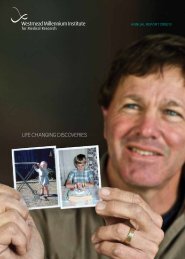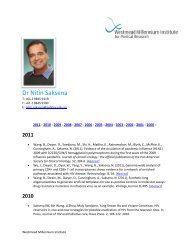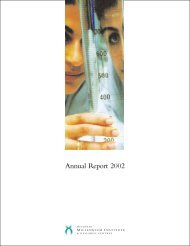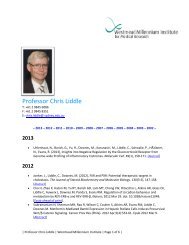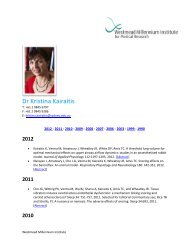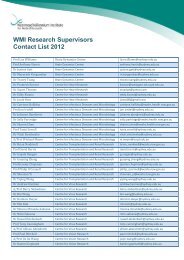Annual Report 2005 - Westmead Millennium Institute
Annual Report 2005 - Westmead Millennium Institute
Annual Report 2005 - Westmead Millennium Institute
Create successful ePaper yourself
Turn your PDF publications into a flip-book with our unique Google optimized e-Paper software.
the BRCA1 proteins that carry this mutation. The mutant BRCA1proteins are positioned differently inside the cell, and are preventedfrom entering the nucleus and complexing with BARD1. This findingprovides another mechanism for changes in DNA repair elicited byBRCA1 gene mutations in breast cancer.This team is also investigating two genes that appear to play keyroles in colorectal cancer: beta catenin and the tumour-suppressorgene APC. APC shuttles between the cytoplasm and the nucleus,where it performs its tumour-suppressor function. This group hasshown that mutant proteins are actively transported in and out ofthe nucleus. In fact, it turns out that cancer-mutated forms of APCcan “shuttle” faster than the normal APC molecule, and theinvestigators aim to determine if this increase in the protein’strafficking rate contributes to the cancer process.Gynaecological cancerOvarian cancer, the most lethal of the gynaecological cancers, isthought to originate from mutations in epithelial cells encasing theovary and little is known about the genes involved in turning healthyovarian epithelial cells cancerous. The Gynaecological CancerGroup have identified several candidate genes that may be involvedin the initial steps leading to cancer. Most ovarian cancers areinitially sensitive to chemotherapy with the platinum-based drugscarboplatin or cisplatin, but eventually develop resistance. Thisgroup has identified a list of genes whose expression levels differbetween resistant and drug-sensitive cells. They have found thatone of these genes is over-expressed in resistant ovarian cancercells and low expression levels correlate with increased sensitivity toplatinum drugs. This gene is also higher in tumours from patientsthat have a worse clinical outcome. The group has submitted aprovisional patent application on the discovery, and is now seekingcompounds to reduce expression of this gene, that could be usedin combination with platinum drugs to treat ovarian cancer.The Australian Ovarian Cancer Study (AOCS) is a majorcollaborative project funded by the US Department of Defence andAustralian Cancer Councils involving WMI, the Queensland <strong>Institute</strong>of Medical Research, Peter McCallum Cancer Centre, and over 20Australian hospitals. AOCS aims to recruit ovarian cancer patientsand create a library of biospecimens for analysis to identify genesinvolved in ovarian cancer. Comprehensive epidemiological data arealso collected to help identify environmental and life-style riskfactors and patients are monitored for a minimum of five years,recording all details of their treatment and its outcome. The data willbe correlated with risk-factor data and tumour-gene profiles toidentify factors for predicting clinical outcome and, eventually,improve the survival of patients with ovarian cancer. More than1600 patients and 1000 cancer-free control women have beenrecruited to the study so far and the analysis phase begins in 2006.Leukaemia and bone marrow researchThis program consists of two main research groups. TheLeukaemia Cell Biology Group is investigating acute lymphoblasticleukaemia (ALL). The most common childhood cancer, ALL arisesin the bone marrow from cells that normally develop into B cells(antibody producing cells). ALL cells are highly dependent on thebone marrow for their growth and survival and this group isinvestigating this dependency with the aim of disrupting thissupportive function. The group has identified SDF-1 as a majorbone marrow derived factor supporting ALL cells. Drugs that blockthe effects of SDF-1 are available and inhibit the growth of ALL cellsin the laboratory. The group is currently testing the ability of thesedrugs in a human leukaemia mouse model. It is anticipated thatthese drugs will enhance the effectiveness of current chemotherapyagents with minimal toxicity, decrease the total dose ofchemotherapy required and help increase the cure rates in patientswith a poor prognosis. This group continues to search for factorsthat are important for the survival and proliferation of ALL cells.Currently the Wnt family of growth factors is being examined aspotential growth regulatory factors in ALL. Wnt proteins areproduced by both the supportive cells in the bone marrow and theleukaemic cells themselves. This group has demonstrated thatthese factors are capable of enhancing the growth and survival ofALL cells. This relative importance of these proteins is currentlybeing investigated.The Cell Therapies group is focused on investigating the use oftargeted cells for the treatment of infectious and malignant diseaseand has continued to develop its clinical program ofcytomegalovirus (CMV) specific cytotoxic T cell administration topatients with impaired immune systems. The group is currentlyrunning a clinical trial of CMV specific T cell administration forpatients recovering after allogeneic bone marrow transplantation,and has resulted in a rapid increase in the percentage of specificcells seen in the circulation. Researchers are in the process ofgaining approval for a gene therapy trial of CMV that will expandentry criteria into the T cell trial and will result in a broader targetspecificity of CMV antigens. Laboratory research is ongoing into thedevelopment of cell therapy for other infections including the fungaldisease Aspergillus and the viral illness varicella zoster thatcommonly affect immunocompromised individuals. In addition, thisgroup is also studying the development of cell therapy for treatmentof minimal residual leukaemia following bone marrowtransplantation. They have optimised a methodology for stimulationof donor T cells with recipient leukaemia cells utilising acombination of different cytokines at various stages of cell culture.




